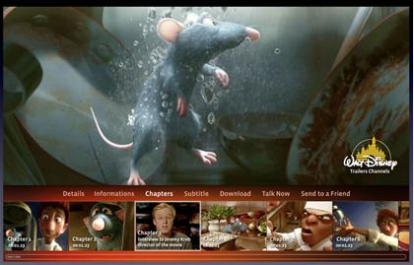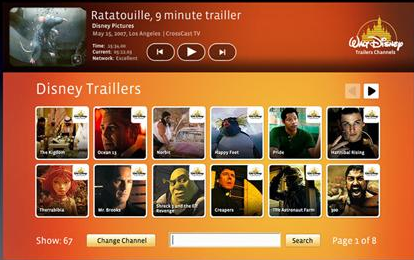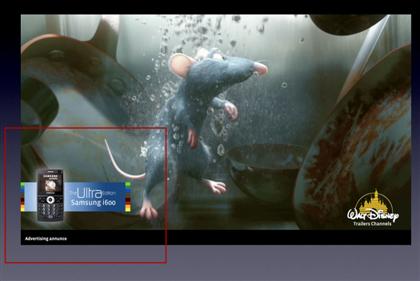
4oD: not explicitly reported, but new media division – spanning other activity too – spent £34.6 million, up £11.5m on 2005. (Source: C4’s 2006 annual report).
60frames: the JV between Hollywood power brokers United Talent Agency and online ad agency Spot Runner. Start-up capital of US $3.5 million. (Source: Globe & Mail, 31 Jul 07)
Babelgum: €220 million [US$288m] (source: C21 Media [by subscription], 19 April 2007). Other sources suggest seed capital of €10 million [£6.78 million] from founder Silvio Scaglia, with a further €70 million pledged during the next three years.
BBC iPlayer: £4.5 million (source: The Sunday Herald [UK], 2 December 2007). Funded by licence fee.
BitTorrent: backed by US $20 million from Accel Parners and DCM.
Break.com: Lionsgate has invested US $21million for a 42% stake.
Brightcove: US $81 million so far… Launched 2005 with $5.5 million funding from General Catalyst Partners and Accel Partners (source: company press release, 1 March 2005). Raised a further $16 million the same year, attracting investment from AOL, IAC/InterActiveCorp, The Hearst Corporation, and Allen & Company LLC (source: company press release, 22 November 2005). A further $59.5 million was sunk by a syndicate led by AllianceBernstein L.P., Brookside Capital LLC, Maverick Capital, Ltd.; the funding round also included investments from The New York Times Company, Transcosmos Investments & Business Development, Inc., as well as all of the company’s existing strategic and financial investors: Accel Partners, Allen & Company LLC, AOL, General Catalyst Partners, The Hearst Corporation, and IAC/InterActiveCorp. (Source: company press release, 17 January 2007).
Bud.tv: backed by parent company Anheuser-Busch to the tune of US $30 to 40 million.
Dave.tv: Provider of video distribution and social networking platforms to content providers, founded in 2003. The company is currently backed by angel investors, including Applied Semantics co-founder Rex Wong, who is believed to have sunk at least half of the company’s initial $7 million funding (source: MarketWatch, 1 Aug 2006). Potential investors take note: the company’s site says “We are in the midst of seeking strategic or venture capital to facilitate our growth.”
ITV Broadband: £20 million (source: Digital Spy, 8 June 2007).
Hulu.com: NBC Universal / NewsCorp.’s JV, originally dubbed ‘Newco’: US $131 million (source: LA Times, 29 June 2007).
Joost: seed capital of US $45 million (source: Wikipedia, 29 June 2007). Backers include Sequioa Capital, Index Ventures – an early investor in Skype – CBS, the US media group, and Li Ka-Shing, the Hong Kong tycoon. Viacom, the US media giant, also has a minority stake.
Vmix: seed capital of US $5 million in 2005 (source: Marketwatch, 1 Aug 2006), plus further funding of $16.5 million in October 2007 (source: Vmix press release, 31 Oct 2007). Founded by former execs from Universal Music Group, Fox Studios, Apple and mp3.com. JK&B Capital and ATA Ventures joined existing investors Mission Ventures and Enterprise Partners in the latest funding round.
Vudu: founded 2004, launching summer 2007. Backed by US $21 million from Benchmark Capital and Greylock Partners.
Vuze: backed by US $13.5 million raised from Redpoint Ventures, BV Capital, Greycroft Partners.
Update 17 Dec 07
Recommended reading: Media and entertainment freelance writer Daisy Whitney has produced this excellent summary of going rates for online video advertising rates on some of the best-known sites.








